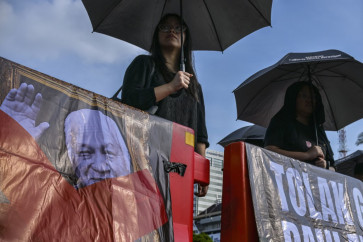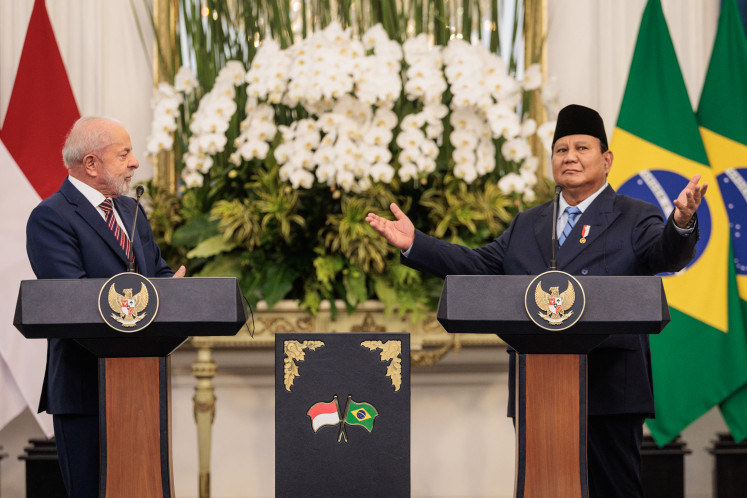Popular Reads
Top Results
Can't find what you're looking for?
View all search resultsPopular Reads
Top Results
Can't find what you're looking for?
View all search resultsPursuing an education in Singapore
Singapore, known as a shopping hub and tourist destination, has long seen the emergence of world-class universities, providing alternative quality education for Indonesians pursuing study overseas
Change text size
Gift Premium Articles
to Anyone
S
ingapore, known as a shopping hub and tourist destination, has long seen the emergence of world-class universities, providing alternative quality education for Indonesians pursuing study overseas.
Besides using English as its first language, with increasing globalization, Singapore has become more of a melting pot. Ethnic Chinese, who make up the majority of the population, Malays, Indians and Eurasians live together harmoniously. Not to mention a large number of expatriates from all over the world living and working there, adding more color and vibrancy to the island-state.
Thanks to its educational system and affordable tuition fees, Singapore can compete with renowned universities in Western countries.
As an education destination, Singapore is becoming increasingly popular among Indonesian students due to its proximity and reasonable living costs.
Aside from being able to mix with the English speaking community, students are encouraged to gain self-confidence. Students are also motivated to stand up for themselves as well as learn how to express themselves better through living within another culture.
"It's just like life training where you push yourself to live independently. Unlike in Indonesia where you are spoiled by the service of maids. Here, in Singapore not only do I have to cook by myself but I also do my own laundry," said Andrew, a foreign student from Indonesia who is currently taking an undergraduate program in economics at the Singapore Institute of Management Global Education (SIM GE).
Established in 1964, SIM is one of the oldest private institutions in Singapore. Currently, the school has an enrollment of over 18,000 students including 3,000 international students from 40 countries worldwide, of which 37 percent are Indonesians.
Having partnerships with universities and institutions from the US, UK, Australia and Switzerland, SIM Global Education offers various high quality academic programs ranging from undergraduate to postgraduate and from certificate to diploma levels.
With more than 50 academic programs offered, SIM has become one of the largest and most comprehensive private education and training institutions in Singapore.
"Our philosophy is to develop our students holistically so as to inculcate a mindset that is sensitive to global dynamics and cross-regional perspectives," Lee Kwok Cheong, Chief Executive Officer of SIM, adding, "We are committed to developing a learning environment that encourages our students to think beyond their own cultural boundaries."
Offering an array of programs such as business management, accounting, finance, economics as well as other social fields like psychology and communication, SIM awards up to 35 scholarships each year to deserving new and existing students.
SIM has, since September last year, added a new campus that is situated on Ulu Pandan Road. Comprising residential, sporting and recreational facilities, this new campus is undoubtedly inclusive. And combined with other SIM campuses on Clementi Road and Namly Avenue, SIM currently has the biggest and most comprehensive campus for a private tertiary institution in Singapore.
National University of Singapore (NUS) can be another choice for those striving to get a world-class education. One of the largest universities in Singapore, it has a student population of over 30,000, of which around 9,000 are graduate students.
Having 14 faculties, the university is comprised of research and education centers and schools that contribute to various fields of study and majors. Some of the fields of study are Law, Engineering, Bioengineering, Architecture, Business Administration, Computer Science, Dentistry, Medicine, Music, just to name a few.
The internship program is another feature of universities in Singapore. The program allows students to form networks and gain valuable hands-on experience in their field.
Many of the courses have a built-in work component, which provides relevance to the student's learning experience while studying.
"Such experiential study experiences give us the opportunity to immediately apply skills and knowledge in the workplace, and enhance employment prospects," Amelia Fung, a student from NUS, remarked.
Amelia is among the NUS students planning to take the Cross-Cultural Internship Program (CCIP) in May this year. Taking place in New York every summer from May to August, CCIP is an internship program that emphasizes East-West cultural exchange. "The program is splendid in a way that students are given cultural experience that can help build an international value," she added.
In addition to providing flexible learning through innovative teaching and delivery methods, a number of universities in Singapore have built an enviable international reputation for fostering outstanding research programs in areas relevant to the students' future.
Nanyang Technological University, for example, focuses on current and emerging world issues through the Nanyang Research Program (NRP).










